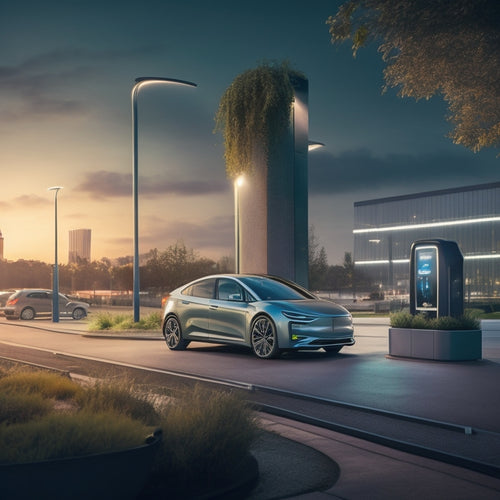
Off Grid Batteries for Solar
Share
You're looking for a reliable battery backup system that can store excess solar energy for nighttime use, providing a steady power supply and enhancing your energy independence during grid outages. When selecting off-grid solar batteries, consider factors like depth of discharge, cycle life, and battery chemistry. Lithium-ion batteries outperform lead-acid batteries in cycle life, with up to 5,000 cycles, and offer higher round-trip efficiency. Proper maintenance, including monitoring state of charge and avoiding extreme temperatures, is essential for ideal performance. As you weigh your options, carefully evaluating these key factors will lead you to the most reliable and efficient off-grid battery solution for your needs.
The Essentials
- Off-grid solar batteries store excess energy for nighttime use, providing a steady power supply and enhancing energy independence.
- Lithium-ion batteries outperform lead-acid batteries in cycle life, with up to 5,000 cycles, making them ideal for heavy use.
- Maintaining a moderate depth of discharge (around 50%) and proper maintenance prolongs battery life and ensures optimal performance.
- Evaluating cycle life and depth of discharge is crucial when selecting off-grid solar batteries, as it determines the number of charge/discharge cycles.
- Integrating renewable energy sources and load management strategies optimize energy usage for critical appliances and reduce reliance on the grid.
Reliable Power During Outages
You're expecting a reliable supply of power, especially during storm season when the grid is most likely to fail.
With a reliable battery backup system, you can prevent costly losses due to food spoilage and damage to electronics Power Outage Protection and maintain continuous power supply for vital systems like medical equipment and security systems.
To maintain continuous power, you need to prep ahead of time with a strong backup power solution.
Storm Season Prep
Storm season prep is critical for off-grid households, as severe weather events can cripple traditional power grids, leaving families in the dark. You must prioritize storm preparedness to guarantee your energy storage system can handle the increased load during extended outages.
Start by performing routine battery maintenance, checking electrolyte levels, and validating proper charging strategies. Consider upgrading your system with more efficient inverters and energy storage capacity to enhance weather resilience.
Having a reliable Backup Power Generator and an uninterruptible power supply (UPS) can provide an immediate and reliable source of power during outages, protecting your sensitive equipment from damage caused by sudden shutdowns.
Create an emergency kit with essential items like flashlights, first aid supplies, and communication devices. Implement load management strategies to optimize energy usage during outages, focusing on critical appliances like refrigeration and lighting.
Inverter efficiency is key, so ascertain it's functioning correctly to provide reliable power. By taking these proactive measures, you'll be better equipped to withstand severe weather events and maintain power reliability.
With a well-prepared off-grid system, you'll enjoy the freedom and security that comes with being self-sufficient during storm season.
Backup Power Solutions
When off-grid households experience prolonged power outages, a reliable backup power solution becomes the difference between comfort and crisis. You need a system that can provide consistent energy when the grid is down, and that's where backup power solutions come in.
These systems are designed to kick in automatically when the power goes out, ensuring your lights, fridge, and other essential appliances stay on. By integrating renewable energy sources, such as solar panels, with energy storage solutions, homeowners can reduce their reliance on the grid and minimize their environmental impact Renewable energy solutions.
When choosing a backup power solution, consider the type of solar battery you have. Different solar battery types have varying charging efficiency rates, which affect how quickly they can recharge during an outage. For example, lithium-ion batteries have higher charging efficiency rates than lead-acid batteries, making them a better choice for backup power solutions.
Look for a system with a high surge capacity to handle sudden power demands, such as when your well pump kicks in. A reliable backup power solution should also have a built-in inverter and charger, ensuring a seamless shift from grid power to backup power.
Increased Energy Independence
You're looking to increase your energy independence by leveraging renewable power sources that reduce your reliance on the grid.
With off-grid batteries for solar, you can store excess energy generated by your solar panels during the day for use at night or during power outages.
By investing in affordable residential battery storage systems home battery storage cost, you can guarantee a steady supply of power even when the grid is down.
This setup provides you with energy self-sufficiency options, allowing you to manage your energy needs more effectively and efficiently.
Renewable Power Sources
How much energy independence do you desire? With renewable power sources, you can break free from the grid and generate your own clean energy.
Solar panels are an excellent option, capturing the sun's energy to power your home or business. However, in order to maximize energy independence, you need a reliable way to store excess energy generated during the day for use during the night or on cloudy days. This is where battery storage efficiency comes in.
When integrating solar panels with your off-grid battery system, it's crucial to take into account the storage capacity and efficiency of your batteries. A high-efficiency battery system guarantees that the energy generated by your solar panels is stored and applied effectively, minimizing waste and reducing your reliance on the grid.
Look for batteries with high depth of discharge (DOD) and round-trip efficiency to assure you're getting the most out of your solar panel integration. By combining solar power with efficient battery storage, you can achieve the energy independence you desire and enjoy the freedom that comes with it.
Energy Self-Sufficiency Options
With energy independence in mind, you're likely exploring various paths to self-sufficiency. One important aspect is energy storage, which enables you to utilize excess energy generated by your solar panels during the day for use at night or during power outages.
Solar integration is key to achieving this, as it guarantees seamless power flow between your solar array, battery bank, and household loads.
To maintain your energy independence, you'll need to take into account battery maintenance, including regular monitoring and replacement of batteries as needed. Load management is also significant, as it allows you to prioritize energy distribution to essential loads, such as refrigeration and lighting, during periods of low energy availability.
A thorough cost analysis will help you determine the most cost-effective solution for your specific needs.
When evaluating energy self-sufficiency options, reflect on the environmental impact of your chosen solution. Installation considerations, such as space requirements and system scalability, are also crucial to guarantee your system can adapt to your growing energy needs.
Depth of Discharge Matters
You need to understand that the depth of discharge (DOD) of your off-grid solar batteries greatly affects their lifespan.
In fact, choosing the right renewable energy solutions can make a big difference in the overall performance of your off-grid energy system. A higher DOD will reduce the number of charge cycles your batteries can handle, resulting in a shorter overall lifespan.
DOD Affects Lifespan
Maximizing the lifespan of your off-grid batteries for solar systems relies heavily on understanding the impact of Depth of Discharge (DOD) on battery longevity.
You see, DOD directly affects how long your energy storage system will last. When you consistently discharge your batteries to 80% or more, you're reducing their lifespan. This is because deep discharging causes capacity degradation, which means your batteries will hold less energy over time.
Conversely, maintaining a moderate DOD (around 50%) helps prolong battery life.
Proper battery maintenance, including monitoring discharge rates and charging efficiency, is essential.
Solar integration also plays a role, as it affects how your batteries are charged and discharged. Temperature effects, usage patterns, and battery technology all influence your system's performance optimization.
Cycle Life Impact
Depth of discharge greatly influences a battery's cycle life, which is the number of charge and discharge cycles it can handle before its capacity degrades.
As you maneuver through the world of off-grid solar batteries, understanding this concept is fundamental. When you consistently discharge your battery to 80% or more, its cycle life will be shorter. Conversely, keeping your depth of discharge (DOD) below 50% can greatly extend the battery's lifespan.
To maximize cycle efficiency, it's important to implement proper battery maintenance. This includes monitoring your battery's state of charge, avoiding extreme temperatures, and ensuring correct charging and discharging procedures.
By doing so, you'll minimize wear and tear on your battery, allowing it to perform at its best over an extended period.
As you aim for energy independence, it's crucial to prioritize your battery's health. By keeping your DOD in check and maintaining your battery correctly, you'll enjoy a longer-lasting power storage solution.
This, in turn, will provide you with the freedom and reliability you need to succeed off the grid.
Cycle Life Matters Most
When selecting an off-grid battery for your solar setup, you'll want to evaluate the lifespan of deep cycles, as it directly impacts the overall cost of ownership.
A battery's cycle life is a critical factor, as it determines how many charge and discharge cycles it can handle before capacity starts to degrade.
For instance, Renogy deep cycle solar batteries are known for their long lifespan, offering up to 4000 cycles reliable energy storage.
Lifespan of Deep Cycles
Your quest for the perfect off-grid battery leads you to a crucial aspect: the lifespan of deep cycles. A deep cycle refers to a full discharge of your battery, and the lifespan is the number of times it can handle this process before its capacity starts to degrade. As you investigate off-grid batteries, you'll notice that manufacturers often provide a cycle life rating, which indicates the number of deep cycles a battery can handle.
| Battery Type | Cycle Life Rating | Recommended Usage |
|---|---|---|
| Flooded Lead-Acid | 200-300 cycles | Avoid deep cycling, ideal for backup power systems |
| AGM Lead-Acid | 300-500 cycles | Suitable for moderate off-grid use, requires proper battery maintenance |
| Lithium-Ion | 1,000-3,000 cycles | Ideal for heavy off-grid use, requires careful charging practices |
| Gel Lead-Acid | 500-800 cycles | Balanced performance and cost, suitable for small off-grid systems |
| Nickel-Cadmium | 1,000-2,000 cycles | Durable, but heavy and toxic, often replaced by Lithium-Ion |
Proper battery maintenance and charging practices greatly impact the lifespan of deep cycles. By understanding your battery's cycle life rating and following recommended usage guidelines, you can guarantee your off-grid system operates efficiently and effectively, giving you the freedom you desire.
Depth of Discharge
As you evaluate the cycle life rating of your off-grid battery, it's equally important to understand the depth of discharge (DOD), which directly impacts the lifespan of deep cycles. DOD refers to the percentage of a battery's capacity that's used during each discharge cycle. A higher DOD means more energy is extracted from the battery, but it also reduces the number of cycles it can handle.
When selecting an off-grid battery, you need to take into account the battery chemistry, which affects its energy efficiency and charging strategies. For instance, lithium-ion batteries are more efficient and can handle deeper DODs than lead-acid batteries.
Discharge rates also play a significant role, as high discharge rates can reduce the battery's lifespan. Solar integration, maintenance practices, and real-time monitoring are also vital to guarantee peak performance and extend the battery's lifespan.
When sizing your system, contemplate the cost considerations and confirm you have the necessary safety features in place. A well-designed system with a suitable DOD will provide you with the freedom and independence you desire from your off-grid solar setup.
Lithium-Ion Beats Lead-Acid Chemistry
You'll find that lithium-ion batteries outperform lead-acid batteries regarding cycle life, with some lithium-ion options offering up to 5,000 cycles or more.
In contrast, lead-acid batteries typically top out at around 1,000 to 2,000 cycles.
This significant difference in cycle life means lithium-ion batteries can provide years of reliable service, making them a better investment for your off-grid solar system.
Longer Cycle Life
I've had extensive experience with both lead-acid and lithium-ion batteries in off-grid solar systems, and I can attest that lithium-ion batteries far surpass their lead-acid counterparts when it comes to cycle life.
You'll find that lithium-ion batteries can last up to 5,000 cycles or more, while lead-acid batteries typically top out at around 1,000 to 2,000 cycles. This means you'll need to replace lead-acid batteries five times more often than lithium-ion batteries, resulting in higher maintenance costs and more time spent on battery maintenance.
Lithium-ion batteries also offer superior energy efficiency, with an average round-trip efficiency of 95% compared to lead-acid's 80%.
This translates to more usable energy and less waste heat, making your off-grid solar system more efficient and reliable. With lithium-ion batteries, you'll experience fewer power outages and less downtime, giving you the freedom to live off the grid without worrying about your energy supply.
Frequently Asked Questions
Can Off-Grid Batteries Be Used for Both Solar and Wind Power Systems?
You can use off-grid batteries for both solar and wind power systems, leveraging different battery types for ideal energy storage, as you'll need to take into account factors like depth of discharge, cycle life, and voltage compatibility for efficient hybrid energy harvesting.
How Do I Properly Maintain and Clean My Off-Grid Solar Batteries?
"An ounce of prevention is worth a pound of cure" - regularly inspect and clean your batteries to prevent corrosion, ensuring a longer battery lifespan; follow maintenance tips like equalizing charges and monitoring water levels to guarantee peak performance.
Are Off-Grid Batteries Compatible With All Types of Solar Panels?
When selecting solar panels, you'll find that not all battery types are compatible, as energy efficiency varies; you'll need to guarantee the voltage and ampere-hour ratings match, so research and choose wisely to optimize your off-grid system's performance.
Can I Use a Single Battery for Both Backup Power and Daily Energy Needs?
You can use a single battery for both backup power and daily energy needs, but you'll need to guarantee it's a deep-cycle battery with sufficient capacity to handle the combined load, and a compatible charge controller to regulate energy flow.
Do Off-Grid Solar Batteries Have Any Certifications or Industry Standards?
Don't you want confirmation your energy storage is reliable? Look for battery certifications like UL 1973 and IEC 62909, which guarantee compliance with industry standards, assuring your off-grid solar system's performance and safety.
Final Thoughts
As you weigh your off-grid battery options, remember the darkness of an outage versus the freedom of energy independence. You'll trade the limitations of lead-acid chemistry for the power and efficiency of lithium-ion. With a reliable battery bank, you'll be the one staying bright while the grid goes dark. The choice is clear: invest in a lithium-ion system that can handle the demands of off-grid living, and shine on, unencumbered by the constraints of the grid.
Related Posts
-

Solid State Batteries in Electric Vehicles
Solid-state batteries revolutionize electric vehicles by offering a longer lifespan and higher energy density than tr...
-

Top Eco-Friendly Camping Equipment for a Sustainable Adventure
When you're camping with the planet in mind, opt for eco-friendly gear like tents made from recycled materials and bi...
-

Top 10 Off Grid Camping Gear Must-Haves
When you're off-grid camping, the right gear is crucial for a smooth expedition. Start with a durable, weather-resist...


